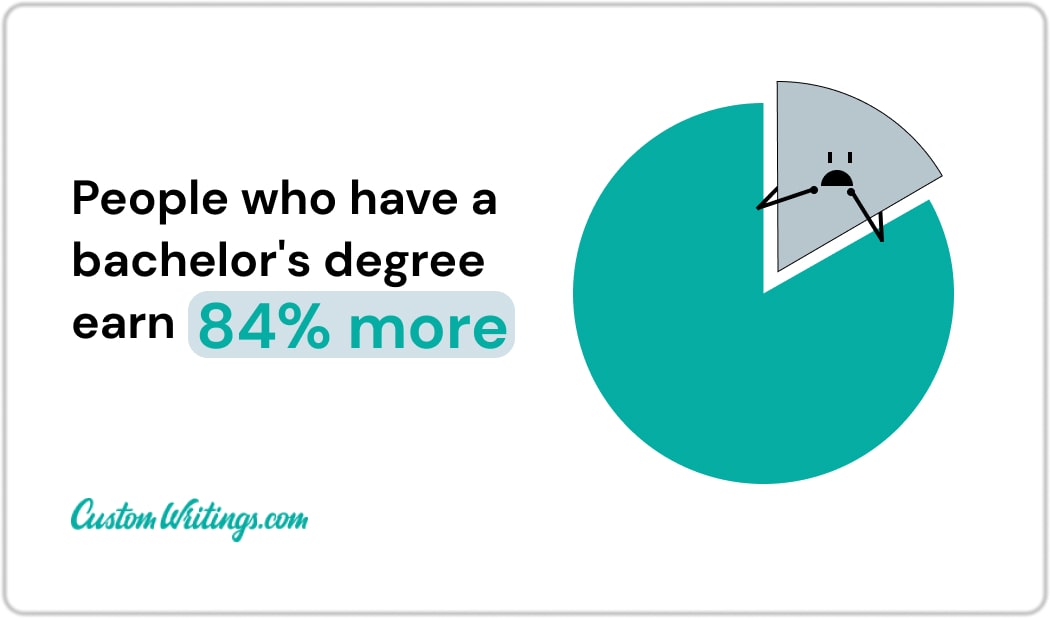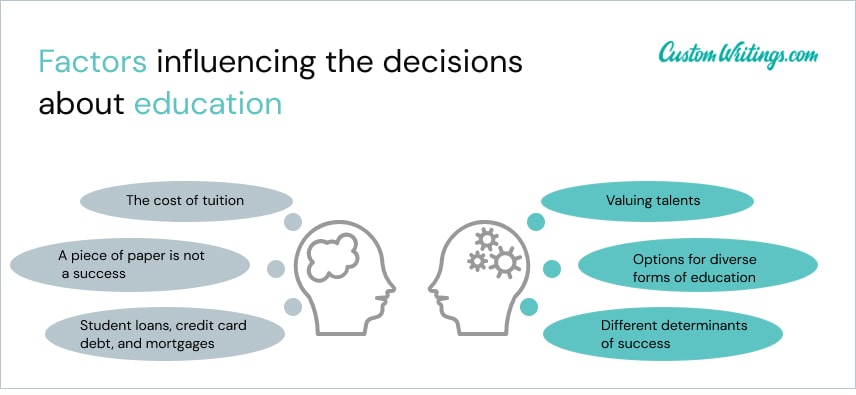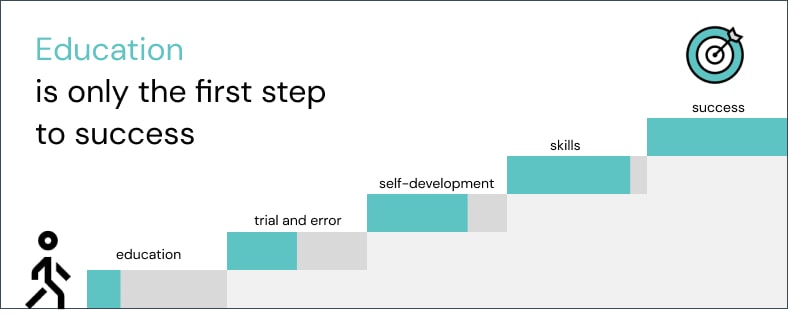Let’s get this straight: a college degree is more than just a fancy piece of paper. It represents a journey of personal growth and experiences. When I pursued my bachelor’s degree in Management, I didn’t just learn about business and administration. I also developed important skills like critical thinking, problem-solving, and communication, especially when I filled out a. Moreover, learning how to prevent college burnout helps me concentrate on the big issues. These skills have been valuable not only in my job, but also in my personal life. So, it’s clear that a degree really matters.
Statistics back up the value of a college degree. People with a bachelor’s degree earn, on average, 84% more than those with only a high school diploma. Plus, the unemployment rate is consistently lower for those with a degree. For further context, it’s useful to explore what the average college graduate earns, as it provides a detailed breakdown of earnings across different fields of study.

While some argue that you can learn without a college degree, let’s face reality. In certain industries, a degree is like a key that opens doors that would otherwise be closed. It offers a chance for career growth and access to opportunities that may not be available to those without formal education. It’s like having a special pass that lets you explore different paths and reach your full potential.
In certain industries, a degree is like a key that opens doors that would otherwise be closed
In addition to the financial benefits, a college degree also provides intangible rewards. It instills confidence and a sense of accomplishment, allowing individuals to pursue their passions and contribute meaningfully to society. Also, a degree enhances social mobility by breaking barriers and creating a level playing field, enabling individuals to overcome socioeconomic limitations and achieve upward mobility through education. So, beyond the statistics, a college degree is a gateway to personal fulfillment and a catalyst for positive change in both individual lives and society as a whole. For more insights, consider this perspective: Is a bachelor’s degree worth it?
Society’s Obsession With Degrees
Here’s the thing: society places a whole lot of emphasis on degrees. It’s like they believe a diploma is the golden ticket to success. And I get it; employers want to hire candidates with the right qualifications. But prospective students and their families should also take into account considering how much the U.S. spends on education, since national funding levels drive tuition prices and determine access to financial aid. They want to ensure that the individuals they bring on board have the necessary skills and knowledge to excel in their roles. But does that mean that those without degrees are automatically doomed? Nah, that’s just straight-up nonsense.
Collage affordability
Let’s take a moment to acknowledge the reality that not everyone can afford college. Higher education often comes with a hefty price tag, and not everyone can handle the financial burden that comes along with it. The cost of tuition, textbooks, and other educational expenses can quickly add up, making it challenging for many people to pursue a college degree. In addition, prospective students should consider the financial burden of student loans, which often extends well beyond graduation and affects long-term financial planning.
Moreover, let’s not forget about the additional financial burdens that individuals may already be carrying. Student loans, credit card debt, and mortgages are just a few examples of the financial responsibilities that many individuals already have to contend with. Adding the cost of college on top of these existing financial commitments can create a significant burden that not everyone can manage.
The definition of success
It’s important for society to recognize that success shouldn’t be solely determined by a piece of paper. A college degree does not define a person’s worth or potential. There are countless examples of individuals who have achieved great success and made significant contributions to society without holding a traditional college degree. They have thrived in their respective fields through their passion, determination, and commitment to continuous learning.
Instead of placing undue emphasis on degrees, we should focus on recognizing and valuing the skills, talents, and experiences that individuals bring to the table. There are various paths to success, and not all of them involve obtaining a college degree. Vocational training, apprenticeships, and entrepreneurship are just a few examples of alternative routes that can lead to fulfilling and prosperous careers.

So, let’s move away from the notion that a college degree is the sole determinant of success. Let’s support individuals in their pursuit of knowledge and personal growth, regardless of the educational path they choose. Success is not limited to those with degrees but is within reach for anyone who is willing to work hard, seize opportunities, and continuously learn and adapt.
The diversity in education
By broadening our perspective and understanding, we can create a society that values diverse forms of education and acknowledges that everyone has unique strengths and capabilities to offer. It’s about empowering individuals to pursue their passions, whether through higher education or alternative avenues, and giving them the opportunity to thrive based on their abilities and contributions.
In the end, it’s the skills, the determination, and the character of an individual that truly matter, not just the presence or absence of a degree.
Unlocking the Power of Essays
What are essays for, you might ask? Well, in my view, essays serve as a powerful tool for self-expression, critical thinking, and the sharing of knowledge. They provide an avenue for individuals to delve deep into a subject, present their thoughts and arguments, and engage in meaningful discourse. Essays are not merely assignments to be completed for a grade; they are opportunities to explore ideas, challenge assumptions, and expand one’s understanding of the world.
- First and foremost, essays are a medium for self-expression. They allow individuals to articulate their thoughts, opinions, and perspectives on a given topic. Through writing, whether you craft social media impact research or deal with personal stories, we can convey our unique voice, weaving together words and ideas to communicate our beliefs and experiences. Essays give us a platform to express ourselves authentically and share our personal stories and insights.
- Moreover, essays foster critical thinking. When crafting an essay, we are encouraged to analyze information, evaluate different viewpoints, and construct coherent arguments. Through this process, we develop our ability to think critically, question assumptions, and form well-reasoned opinions. Essays prompt us to dig deeper, conduct research, and engage with diverse sources to support our claims. They teach us to be discerning, to weigh evidence, and to present a persuasive case.
- Essays also serve as a means of sharing knowledge. By researching and writing about a particular subject, we contribute to the collective understanding of society. We can explore a wide range of topics, from historical events and scientific discoveries to social issues and philosophical debates. Essays enable us to share our findings, insights, and discoveries with others, fostering intellectual growth and facilitating meaningful discussions.
- Essays engage the readers and form their opinions. For example, let’s say I’m writing an essay on the impact of social media on interpersonal relationships. Through my research and analysis, I can present various perspectives, discuss the advantages and disadvantages, and offer recommendations for maintaining healthy connections in the digital age. My essay becomes a valuable resource that informs and engages readers, encouraging them to reflect on their own experiences and consider alternative viewpoints.
- Also, essays play a crucial role in academic and professional settings. They demonstrate our ability to articulate ideas effectively, to construct logical arguments, and to communicate complex concepts. Whether it’s writing an essay for a college application or presenting a well-researched paper at a conference, our ability to convey our thoughts and insights through writing is highly valued.
The Value of Learning Beyond the Classroom
Look, I’ll be the first to admit that college ain’t for everyone. Some people thrive in a classroom setting, while others prefer to learn through hands-on experience. The beauty of education lies not only in formal institutions but also in the real world. It’s about embracing diverse paths and recognizing the value of different avenues of learning.
High school diplomas are important, no doubt about it. They lay the foundation for future endeavors and provide essential knowledge and skills. But let’s not forget that learning doesn’t stop once you throw your cap in the air. Life itself is a continuous learning process. You can gain knowledge and skills from various sources, whether it’s through internships, online courses, or good old-fashioned trial and error.

In fact, statistics show that there is a growing recognition of the value of non-traditional learning experiences. According to a survey conducted by the National Association of Colleges and Employers, employers are increasingly placing importance on skills and experiences gained outside of the classroom. My colleagues agreed that they value transferable skills such as critical thinking, problem-solving, and communication, which can be developed through internships and hands-on experiences.
Moreover, the rise of online learning platforms has made education more accessible and flexible. Gitnux reveals that in 2019, the number of students enrolled in at least one online course reached 6.6 million. This demonstrates the increasing popularity and acceptance of non-traditional forms of education.
Let’s take internships as an example. These valuable experiences provide opportunities to apply classroom knowledge in real-world settings, develop practical skills, and make meaningful connections in industries of interest. Internships not only enhance a person’s resume but also offer valuable insights and hands-on learning that cannot be replicated in a traditional classroom environment.
6.6 million students enrolled in at least one online course
Similarly, online courses have become a game-changer in the education landscape. They allow individuals to learn at their own pace, from the comfort of their homes, and often at a lower cost compared to traditional college programs. Online learning platforms offer a wide range of courses on various subjects, providing individuals with the flexibility to tailor their learning journey to their specific interests and career goals.
Let’s not underestimate the power of trial and error either. The real-world experiences gained through taking risks, trying new things, and learning from failures can often be just as valuable, if not more so, than formal education. Many successful entrepreneurs and professionals have achieved great heights through a combination of perseverance, self-directed learning, and hands-on experience.
Some Questions and Answers on College Degree
- Does it matter to have a college degree for my future?
Whether having a college degree matters is a complex question. While a degree can definitely bring benefits like earning more money and having better job opportunities, it’s important to know that success isn’t only determined by formal education. Prospective students should also consider considering the high cost of earning a degree—the expenses often extend far beyond tuition and impact long-term financial outcomes. Society should appreciate different kinds of education and recognize the unique strengths that people have.
- Are essays important for my education?
Essays are more than just school assignments. They help us express ourselves, think critically, and share knowledge. Writing essays teaches us important skills like analyzing information, doing research, and convincing others. These skills are valuable in school and work.
- How to improve my learning skills?
Learning isn’t only about being in a classroom. Non-traditional forms of education are becoming more accepted. Internships, online courses, and real-life experiences give us chances to learn practical skills, make connections, and explore our interests. Online learning platforms have made education easier to access and more flexible, so people can learn what they want, when they want.
- What is the value of education?
The value of education goes beyond just getting a degree. It’s about personal growth, gaining skills, and having experiences. Education is a lifelong journey of learning and adapting. Success should be judged by how determined, responsible, and helpful a graduate is to society, not just whether they have a degree.
So, let’s have a broader view of education, appreciate different paths to success, and encourage people to follow their passions and reach their full potential. Education isn’t limited to classrooms. It’s a lifelong pursuit of knowledge and personal growth that can make a positive impact on individuals and society as a whole.





